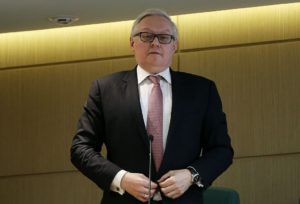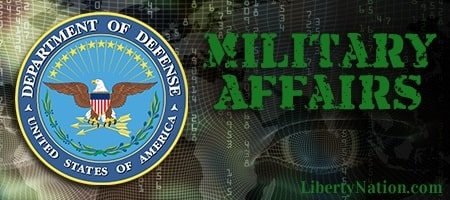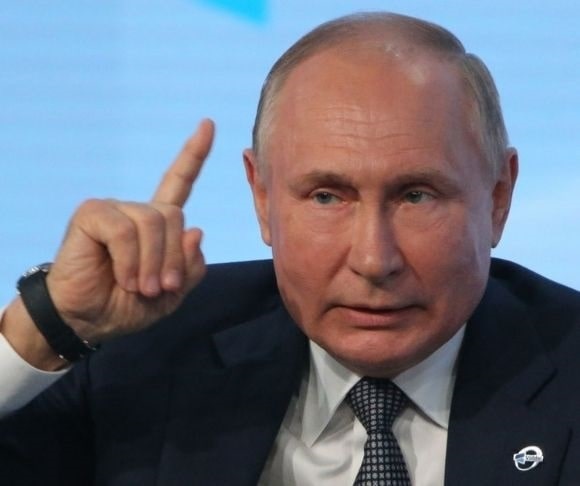In his Dec. 7 video call with Russia’s President Vladimir Putin, Joe Biden might not have come across as the tough, resolute guy portrayed by National Security Advisor Jake Sullivan. It appears Russia was not intimidated, as its next move in the conflict over Ukraine was to threaten a nuclear attack on Europe. Reuters reported: “Russia said on [December 13] it may be forced to deploy intermediate-range nuclear missiles in Europe in response to what it sees as NATO’s plans to do the same.” Such weaponry has a radius of operation between 310 miles and 3,400 miles. In the high-stakes world of geopolitical nuclear extortion, Putin was the first to make a play.

Sergei Ryabkov (Photo by Stanislav Krasilnikov\TASS via Getty Images)
Russia’s Deputy Foreign Minister Sergei Ryabkov threatened that Moscow “would be forced to act if the West declined to join it in a moratorium on intermediate-range nuclear forces (INF) in Europe – part of a package of security guarantees it is seeking as the price for defusing the crisis over Ukraine.” The Kremlin is making crystal clear to the Biden national security team that if the United States and NATO do not provide written guarantees that Ukraine will not become a part of the NATO alliance, Putin will play the nuclear card and put all of Europe at risk.
If ever there was a regressive move recalling the specter of the Cold War days, Ryabkov has put it out there. Shades of a nuclear arms race seem to be materializing. Nonetheless, threatening the deployment of nuclear-tipped intermediate-range missiles indicates two things.
First, Ryabkov’s saber-rattling confirms that President Donald Trump was correct in withdrawing from the 1987 Intermediate-Range Nuclear Forces (INF) Treaty signed by U.S. President Ronald Reagan and Soviet President Mikhail Gorbachev. Trump did not value the agreement since the United States was the only co-signer in compliance. Furthermore, without China included, the talks were not meaningful.
Second, the Kremlin admitted it had developed and was capable of deploying the nuclear missiles prohibited by the INF, putting Europe in danger of nuclear attack. Russia violated the treaty by creating a ground-launched cruise missile “Moscow calls the 9M729 and NATO refers to as the ‘Screwdriver.'” In fact, NATO analysts believe that “Russia has already deployed this system in the European part of the country, west of the Ural Mountains.” If true, Ryabkov’s attempts at intimidation ring a little hollow.
The genius of Russia’s move, however, is impressive. The United States and its European allies believed the Ukraine border conflict was limited to the U.S. moving troops to existing NATO countries and imposing severe economic sanctions on Moscow if Putin invaded Ukraine. The idea that Moscow would resurrect the Cold War ploy of extorting agreements by threatening the employment of nuclear weapons wasn’t part of the public conversation or, one suspects, in the minds of Biden’s team.
 If you look at Ryabkov’s statement, the Kremlin gets a “twofer”: join the moratorium on INF and agree to the “package of security guarantees” for Ukraine. The negotiations on the INF moratorium are something the Biden administration favors, while the United States has rejected the NATO guarantees the Russians are adamant about, asserting that, as a sovereign country, Ukraine has the right to align itself however it chooses.
If you look at Ryabkov’s statement, the Kremlin gets a “twofer”: join the moratorium on INF and agree to the “package of security guarantees” for Ukraine. The negotiations on the INF moratorium are something the Biden administration favors, while the United States has rejected the NATO guarantees the Russians are adamant about, asserting that, as a sovereign country, Ukraine has the right to align itself however it chooses.
In its rebuttal, “NATO says there will be no new US missiles in Europe, and it is ready to deter new Russian missiles with a ‘measured’ response that would only involve conventional weapons.”
From a global perspective, the South China Morning Post claimed that “escalating tensions over Ukraine could lead to a repeat of the Cuban missile crisis.” When asked if he saw similarities between the current situation and the 1962 confrontation over the Soviet Union’s mid-range missiles stationed in Cuba, Ryabkov responded that he did. He said, “You know, it really could come to that. If things continue as they are, it is entirely possible by the logic of events to suddenly wake up and see yourself in something similar.”
Whether we are headed for a new cold war, a renewed nuclear arms race, or a standoff with Russia like the Cuban missile crisis, the United States and the West have been in this scary situation before. It takes grit and resolve to confront menacing Russian behavior. The real question is will President Biden stand tall in the face of the Kremlin’s attempted extortion?
The views expressed are those of the author and not of any other affiliation.
~ Read more from Dave Patterson.




